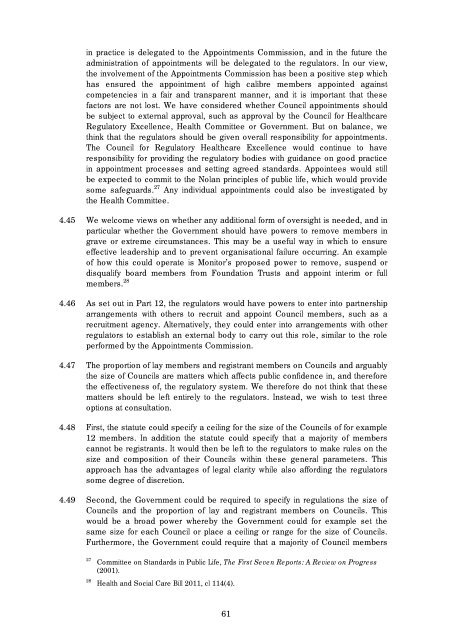Regulation of Health and Social Care Professionals Consultation
Regulation of Health and Social Care Professionals Consultation
Regulation of Health and Social Care Professionals Consultation
Create successful ePaper yourself
Turn your PDF publications into a flip-book with our unique Google optimized e-Paper software.
in practice is delegated to the Appointments Commission, <strong>and</strong> in the future the<br />
administration <strong>of</strong> appointments will be delegated to the regulators. In our view,<br />
the involvement <strong>of</strong> the Appointments Commission has been a positive step which<br />
has ensured the appointment <strong>of</strong> high calibre members appointed against<br />
competencies in a fair <strong>and</strong> transparent manner, <strong>and</strong> it is important that these<br />
factors are not lost. We have considered whether Council appointments should<br />
be subject to external approval, such as approval by the Council for <strong>Health</strong>care<br />
Regulatory Excellence, <strong>Health</strong> Committee or Government. But on balance, we<br />
think that the regulators should be given overall responsibility for appointments.<br />
The Council for Regulatory <strong>Health</strong>care Excellence would continue to have<br />
responsibility for providing the regulatory bodies with guidance on good practice<br />
in appointment processes <strong>and</strong> setting agreed st<strong>and</strong>ards. Appointees would still<br />
be expected to commit to the Nolan principles <strong>of</strong> public life, which would provide<br />
some safeguards. 27 Any individual appointments could also be investigated by<br />
the <strong>Health</strong> Committee.<br />
4.45 We welcome views on whether any additional form <strong>of</strong> oversight is needed, <strong>and</strong> in<br />
particular whether the Government should have powers to remove members in<br />
grave or extreme circumstances. This may be a useful way in which to ensure<br />
effective leadership <strong>and</strong> to prevent organisational failure occurring. An example<br />
<strong>of</strong> how this could operate is Monitor’s proposed power to remove, suspend or<br />
disqualify board members from Foundation Trusts <strong>and</strong> appoint interim or full<br />
members. 28<br />
4.46 As set out in Part 12, the regulators would have powers to enter into partnership<br />
arrangements with others to recruit <strong>and</strong> appoint Council members, such as a<br />
recruitment agency. Alternatively, they could enter into arrangements with other<br />
regulators to establish an external body to carry out this role, similar to the role<br />
performed by the Appointments Commission.<br />
4.47 The proportion <strong>of</strong> lay members <strong>and</strong> registrant members on Councils <strong>and</strong> arguably<br />
the size <strong>of</strong> Councils are matters which affects public confidence in, <strong>and</strong> therefore<br />
the effectiveness <strong>of</strong>, the regulatory system. We therefore do not think that these<br />
matters should be left entirely to the regulators. Instead, we wish to test three<br />
options at consultation.<br />
4.48 First, the statute could specify a ceiling for the size <strong>of</strong> the Councils <strong>of</strong> for example<br />
12 members. In addition the statute could specify that a majority <strong>of</strong> members<br />
cannot be registrants. It would then be left to the regulators to make rules on the<br />
size <strong>and</strong> composition <strong>of</strong> their Councils within these general parameters. This<br />
approach has the advantages <strong>of</strong> legal clarity while also affording the regulators<br />
some degree <strong>of</strong> discretion.<br />
4.49 Second, the Government could be required to specify in regulations the size <strong>of</strong><br />
Councils <strong>and</strong> the proportion <strong>of</strong> lay <strong>and</strong> registrant members on Councils. This<br />
would be a broad power whereby the Government could for example set the<br />
same size for each Council or place a ceiling or range for the size <strong>of</strong> Councils.<br />
Furthermore, the Government could require that a majority <strong>of</strong> Council members<br />
27<br />
Committee on St<strong>and</strong>ards in Public Life, The First Seven Reports: A Review on Progress<br />
(2001).<br />
28 <strong>Health</strong> <strong>and</strong> <strong>Social</strong> <strong>Care</strong> Bill 2011, cl 114(4).<br />
61
















